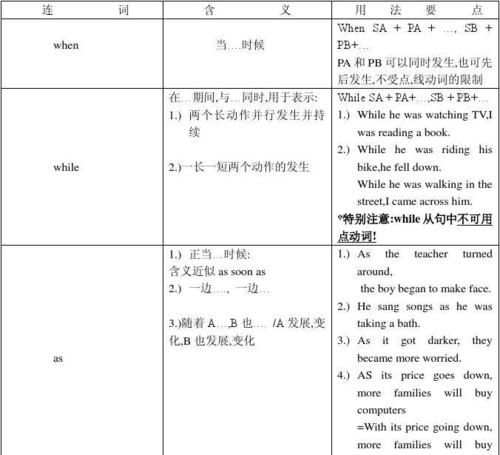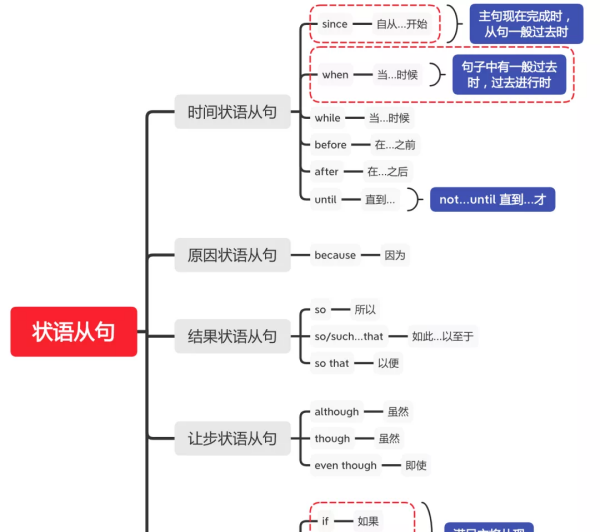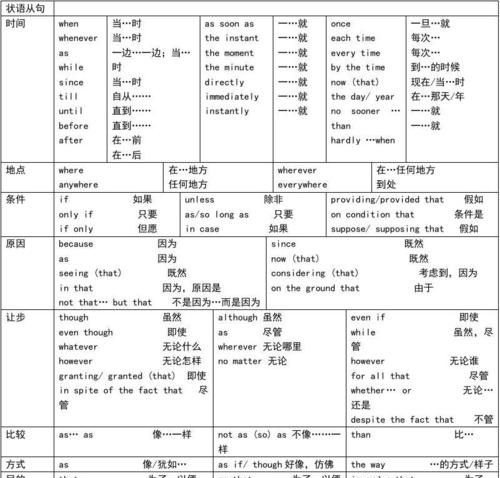本文目录
九种状语从句的从属连词
it
is
very
useful
to
your
english.
时间状语从句when,
whenever,
while,
as,
before,
after,
since,
till,
once,
as
soon
as,etc.
地点状语从句where,wherever
原因状语从句because,
since,
as,
for,
now
that,
etc.
目的状语从句in
order
that,
so
that,
that,
etc.
结果状语从句so…that,
so
that,
such…that,
that,
etc.
条件状语从句if,
unless,
as(so)long
as,
etc.
让步状语从句though,
although,
even
if,
even
though,
however,
whatever,
as,etc.
比较状语从句as…as,
so…as,
than,
etc.
方式状语从句as,
as
if,
as
though,
etc.

地点状语从句先行词有哪些
你好,状语从句的连接词如下图,感谢采纳~

九大状语从句有哪些先行词,连接词定义
1、时间状语从句。
2、地点状语从句。
3、原因状语从句。
4、条件状语从句。
5、目的状语从句。
6、让步状语从句。
7、比较状语从句。
8、方式状语从句。
9、结果状语从句。
状语从句中的从句可以修饰谓语、非谓语动词、定语、状语或整个句子。根据其作用可分为时间、地点、原因、条件、目的、结果、让步、方式和比较等从句。
状语从句一般由连词(从属连词)引导,也可以由词组引起。从句位于句首或句中时通常用逗号与主句隔开,位于句尾时可以不用逗号隔开。

扩展资料
一般情况下,时间和条件状语从句的谓语动词一般用“一般现在时”表示“一般将来时”,用“现在完成时”表示“将来完成时”。例如:
1、I will call you as soon as I arrive in Beijing. 我到北京就将给你打电话。
(这是由as soon as引导的时间状语从句,从句中的谓语动词arrive是一般现在时,表示一般将来时,绝不可用will arrive)
2、As soon as I have finished this work, I will have gone home.如果我早点完成工作的话,我现在已经到家了。
(从句中的谓语动词用现在完成时have finished,表示将来完成时,绝不可用will have finished)
3、If he comes back, please let me know.如果他回来了,请通知我。
(从句中的谓语动词用comes back,表示一般将来时,绝不可用will come back)
从句通常结构:主 do sth.do sb.(条件)+ V.结果。
参考资料来源:百度百科-状语从句
英语状语从句有哪几种
英语状语从句分8种:
1.时间状语从句(adverbial clauses of time),多由连词引起。
(when,after,before,as,as soon as,as long as,since,whenever,once)
E.g. When we lived in town we often went to the theater.
It was a long time before I got to sleep again.
As the sun rose the fog dispersed(vt. 消散).
少数不由连词引起状语从句。
(now that,every time,each time,the moment,immediately,instantly,directly)
E.g. Directly he uttered(vt. 说出)these words, there eas a dead silence.
I had no sooner checked in the hotel than he arrived.
2.地点状语从句(adverbial clause of place)
(where,wherever,anywhere)
E.g. The church was built where there had once been a roman temple(n.寺庙).
Everywhere I go, I find the same thing.
3.方式状语从句(adverbial clause of manner),一般由as,like,as if引起。
E.g. I am as you can image short of money. 正如你能想象的那样,我很缺钱。
I did as she asked.
Do it as he does.
I feel just like I did when I was a boy.
I remember the whole thing as if it happened yesterday.
He glanced about as if in search of something.
4.原因状语从句(adverbial clause of reason), 一般由because,as,since,in case,还有两个词有相同的意思(seeing,considering)
E.g. He was angry because we were late.
As the soup was very salty, we were thirsty afterwards.
He took a spoonful(n.满满的一勺) and tasted it in case it was hot.
Seeing that it is ten o’clock, we shall not wait for her any longer.
5.条件状语从句,一般由if,unless,supposing, providing,as long as, granted that引起。
E.g. We sat on the grass if it was fine.
If I could afford it, I would buy a boat.
If necessary, ring me at home.
Supposing he can’t come, who will do the work?
6.让步状语从句(adverbial clause of concession),主要由although, though, even though, while,whereas。
E.g. Though we are poor, we are still happy.
Some praise him, whereas others condemn him.
Though not large, the room was well lit.
7.目的状语从句和结果状语从句(adverbial clause of purpose and adverbial clause of result),主要由so that,such that, in order that,otherwise,else.
E.g. Let’s take the front seats that we may see more clearly.
Give me back the money, otherwise I’ll ring the police.
Hurry up or else you’ll be late.(赶快,否则你就会迟到了。)
8.比较状语从句(adverbial clauses of comparison),主要由than ,as 引起。
E.g. You sing better than I do.
I haven’t done as much as I should have liked.(我没做得像我希望的那样好。)

以上就是关于九大状语从句的连词 ,九种状语从句的从属连词的全部内容,以及九大状语从句的连词 的相关内容,希望能够帮到您。
